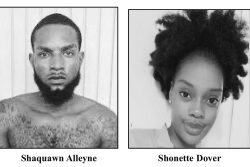The Integrity Commission will soon start its examination of approximately 300 declarations, including one submitted by Public Telecommunications Min-ister Cathy Hughes, commission Chairman Kumar Doraisami said on Thursday.
The local anti-corruption watchdog Trans-parency Institute of Guyana Inc (TIGI) last month expressed concerns that there may be a potential conflict of interest for Minister Hughes, given that her husband, attorney Nigel Hughes, is a managing director of the Hughes, Fields and Stoby law firm, which recently established an office in Houston, Texas to provide legal services to clients in the oil and gas sector.
In response, Minister Hughes informed that on July 4th, 2018, she submitted her declaration of assets and interest to the Integrity Commission and then on October 9th, repeated her disclosure to Cabinet about her husband’s position in the law firm and the impending establishment of a Houston office. While she is awaiting the advice of cabinet and one of two lawyers she consulted, she has assured that she will excuse herself from any energy discussions at the Cabinet level.
Sunday Stabroek contacted Doraisami day to determine whether the examination of the minister’s declaration was completed.
“No, we haven’t actually looked at it yet. We actually set some time during the [next] week when all three commissioners would sit. Right now we haven’t been able to meet… definitely next week we will look at them,” he said.
Doraisami, a former land court judge who is now in private practice, attorney Rosemary Benjamin-Noble and Pandit Rabindranath Persaud make up the commission, which was established in February this year. The office of the Integrity Commission is located at Church Road, Subryan-ville.
The Chairman could not recall when the minister submitted her declaration but informed that of the close to 1,300 forms sent out to persons occupying public offices, “we only received about 300 up to last month.”
He said that the declarations were “coming in slowly” and that the other members of the commission will dedicate some time to look at the forms submitted.
“Remember, the commissioners are not full-time employees. We are all employed elsewhere and we try to meet as often as we can. Sometimes, when someone is sick we have to wait until they recover,” he said. Doraisami was in Berbice when he spoke with this newspaper.
Noting that declarations are “coming in now, compared to before,” he said that the commission is determined to speed things up.
Asked for a breakdown of those who have so far submitted, he said that he did not have all the information regarding this within his reach. He was able to say with certainty, though, that parliamentarians – both government and opposition— and other categories of government officials have made declarations.
He said when the commission sits and looks at the forms, it would be able to separate them according to Ministers, Permanent Secretaries, Deputy Permanent Secretaries and the other categories.
Further, he explained that the commission will be looking at the assets and liabilities of persons in public life and whether those officials sent in the required supporting documents. He said in instances of property ownership, the commission would expect to see a transport, and in instances of information pertaining to a bank account, a bank statement is required.
He said that if additional information is needed, the commission will write the official requesting same.
Interviews for persons who have applied for certain positions were set to be conducted on Friday and work is being done on a budget, Doraisami said.
“We can’t hire without money,” he said, before expressing optimism that the required staff will be in place in a month’s time.
According to the Integrity Commission Act, every person who is a person in public life, not being a member of the Commission, is required to file a declaration every year on or before 30th June and in cases where such persons cease to be a person in public life, within thirty days from the date on which the person ceases to be a person in public life.
“A declaration under subsection (I) or (2) shall give full, true and complete particulars of the assets and liabilities as on the relevant date, and the income during a period of twelve months immediately prior to the relevant date, of the person filling the declaration (whether the assets were held by that person in his own name or in the name of any other person) and of the spouse and children of such person to the extent to which such person has knowledge of the same,” it further states.
It states that where a person in public life holds any money or other property in trust for another person, not being his spouse or child or another person in public life, he shall so state in his declaration but shall not be required to disclose the terms of the trust.
“A person in public life is required to disclose in his declaration… such details in respect of the income, assets and liabilities of himself and those of his spouse and his children, as by the exercise of reasonable care should be known to him,” the Act states, adding that for the purposes of a declaration under Section 13, the income, assets and liabilities of a person in public life, his spouse and his child shall include the income, assets and liabilities acquired, held or incurred by any other person as agent or on behalf of all or any of them.
Any direct or indirect benefit accruing to the income or assets of a declarant or his spouse or child must be disclosed in a declaration under section 13, it states.
The Act, while outlining what happens in instances of blind trust, explained that a person is associated with another where that other person is the spouse or child of the person or the partner of the person in a professional, trade, or commercial undertaking; or a corporation and the first mentioned person or the spouse or the child controls the corporation, its holding corporation or a corporation affiliated with either.
Further, it states that the Commission or the President, as the case may be, shall receive, examine and retain all declarations and documents filed with it or him under the Act; and make such enquiries as it or he considers necessary in order to verify or determine the accuracy of the financial affairs, as stated in the declarations of persons who are required to file declarations under this Act.
In a case where there is a failure to file declarations or furnish particulars, the Act the Commission or the President, as the case may be, shall “publish the fact in the Gazette and in a daily newspaper.”
Those officials who fail to submit their declarations or submit declarations that are false or incomplete shall be liable, on summary conviction, to “a fine of twenty-five thousand dollars and to imprisonment for a term of not less than six months nor more than one year, and where the offence involves the non-disclosure, by the declarant, of property, which should have been disclosed in the declaration, the magistrate convicting the person shall order the person to make full disclosure of the property within a given time and on failure to comply with the order of the magistrate within the given time, the said offence shall be deemed to be a continuing offence and the person shall be liable to a further fine of ten thousand dollars for each day on which the offence continues,” the Act states.







